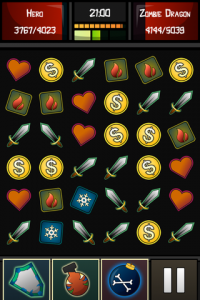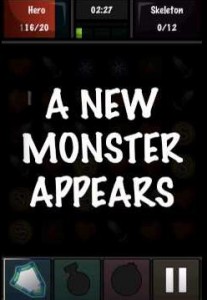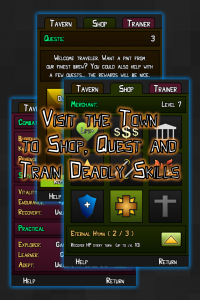Just about when I thought I had already seen every single last way to possibly twist the concept of object matching puzzle games, Pantazis Deligiannis went and found another one by the name of Dungeon Story (out now, $0.99). In Dungeon Story you are a valiant adventurer – or whichever class you prefer to be – delving the depths of dangerous tombs for riches and mystical items, leveling up and becoming stronger with each foe you slay. However – as you probably already guessed – all of the combat in Dungeon Story is done in the form of an object matching game, rather than using a more traditional RPG combat interface.
 Littering the playing field in Dungeon Story are four kinds of icons: hearts, coins, magic spells, and swords. On each turn you will be allowed to draw as long an unbroken chain as possible – being permitted to connect same type symbols in any direction, including diagonals – so long as it includes at least three items, and you are even allowed to draw backwards should you want to reconsider an action. Specifically: gathering swords creates a physical attack, gathering spells causes you to attack magically, gathering hearts will let you regain health, and gathering coins naturally increases your wealth.
Littering the playing field in Dungeon Story are four kinds of icons: hearts, coins, magic spells, and swords. On each turn you will be allowed to draw as long an unbroken chain as possible – being permitted to connect same type symbols in any direction, including diagonals – so long as it includes at least three items, and you are even allowed to draw backwards should you want to reconsider an action. Specifically: gathering swords creates a physical attack, gathering spells causes you to attack magically, gathering hearts will let you regain health, and gathering coins naturally increases your wealth.
Dungeon Story’s primary strategy comes in the form of how you manage the ebb and flow of the symbols that comprise the field, and merely making the absolutely longest chain possible is not always in your best interest. If the field is awash in swords touching each other, then using all of them on an almost dead monster makes no sense when you could have saved the lion’s share of the combo for the next opponent. On the flip side of things, sometimes you’ll deliberately try to use every last symbol on the field – even though they don’t currently represent a useful action – if they’re clogging up the gameplay area.
Alternatively, sometimes you will choose to use a special item from your inventory by expending the energy you have stored up so far. Every time you get hit by a monster – assuming the enemy is not leaching your energy – your power gauge will fill up, and the kinds of items you can use (assuming you have them) will be determined by how many units of your energy gauge have been completely filled. Energy gauge items include a variety of things such as shields that help absorb damage, potions for fast health recovery, bombs that both damage your opponent and reset the field, and more.
 While many of the opponents you will run into during your journey will simply be content to trade blows until one of you expires, other enemies – known as special monsters – will show up and harass you with powerful abilities. Some of them will drain your special move energy, some of them can reshuffle the playing field at will, some of them can poison you, some of them will be resistant to a certain kind of damage, and so on and so forth. Failing to pay attention to what the ability of a special monster is can get you into a lot of trouble very fast, especially if it has been equipped with the dangerous reflection skill that bounces back half of the damage you attack with.
While many of the opponents you will run into during your journey will simply be content to trade blows until one of you expires, other enemies – known as special monsters – will show up and harass you with powerful abilities. Some of them will drain your special move energy, some of them can reshuffle the playing field at will, some of them can poison you, some of them will be resistant to a certain kind of damage, and so on and so forth. Failing to pay attention to what the ability of a special monster is can get you into a lot of trouble very fast, especially if it has been equipped with the dangerous reflection skill that bounces back half of the damage you attack with.
Occasionally you will run into a merchant while exploring, at which point he will offer to sell you a temporary power up from the randomly selected inventory he currently has on hand. The effects of these various boosters will only last until the end of your current dungeon trip, and can curiously only be bought with coins that you picked up during said expedition as well. Perhaps the most bizarre part is that if you buy nothing from the merchant – either because he didn’t have anything that you wanted, or you did not yet have enough money – then you will have to kill the vendor in combat before you can get back to tackling monsters.
Outside of the dungeon there are many other ways you can spend your money that are far more permanent: such as better weapons for increased physical attack damage, better spell books for improved magical damage, better armor for reduced over all damage taken, as well as those power-gauge items that I mentioned earlier. You can also choose to spend your hard earned cash on training that applies permanent stat increases, such as +2% physical damage, on top of everything else that you already have. Perhaps the strangest way you can spend money is to invest it into the local merchant’s guild, which has the over all effect of increasing the quality of the random items that dungeon met peddlers will have for sale.
 Also in town is the pub, the place where you can attempt quests to increase your reputation (because everyone knows that particularly famous heroes get discounts when they need to buy stuff). It is worth noting that you do not gain any experience or gold when you successfully complete a quest, apparently because you spent all of that money getting smashed out of your mind at the tavern (after which you were too drunk to learn any valuable lessons from your exodus). The chief problem with the quest system is that the difficulty of the objective given often does not reflect the amount of reputation points being offered, and often some of the higher reward quests will end up being far easier than the missions with lower payoffs.
Also in town is the pub, the place where you can attempt quests to increase your reputation (because everyone knows that particularly famous heroes get discounts when they need to buy stuff). It is worth noting that you do not gain any experience or gold when you successfully complete a quest, apparently because you spent all of that money getting smashed out of your mind at the tavern (after which you were too drunk to learn any valuable lessons from your exodus). The chief problem with the quest system is that the difficulty of the objective given often does not reflect the amount of reputation points being offered, and often some of the higher reward quests will end up being far easier than the missions with lower payoffs.
Speaking of improper difficulty curves, that now brings me to my primary complaint with Dungeon Story: the fact that you can be stuck in a dungeon long after its challenges are irrelevant to you before the game decides to let you move on to the next region. The next dungeon in the game unlocks when you finally find the special hidden treasure within the tomb you are currently exploring, but it is far too easy to achieve a Godly mastery of the current level long before the game deigns to drop the artifact onto the playing field. This creates a situation where the game stops being fun and turns into a incredibly boring chore to play while you wait for Dungeon Story to decide you are finally ready for monsters with more oomph.
The last thing worth noting is that Dungeon Story features an online arena where people can do battle against each other using the characters they have spent time leveling up, and thankfully it also includes an option to only match you up against players using a similarly leveled champion. It furthermore brings me great joy to proclaim that Dungeon Story features no form of character boosting IAP options what-so-ever, so you will never feel as if you need to buy-in just to keep up with other players in online fights. That said, the game does feature an IAP based tip-jar feature should you decide to give Pantazis Deligiannis more for Dungeon Story than the price he is currently selling it for.
iFanzine Verdict: Dungeon Story currently features two great flavors that, while tasting great together, don’t yet meld quite as well as the legendary mixture of peanut butter and chocolate. The game is a lot of fun to play when the dungeons are being properly challenging, but Dungeon Story can feel like a form of office work when you’re waiting desperately for the next level to unlock because you’ve already become far too powerful/skilled for the current enemies. It would also really help if the difficulty to reward ratio on the quest system was fixed up, as it is really frustrating that the so called difficult quests were practically trivial compared to the ones that claim to be easy. That said, I do immensely respect that Dungeon Story’s online mode has an option to match you up with another player based on your levels (nothing quite like being pitted against someone 50 levels above you to ruin your day).

